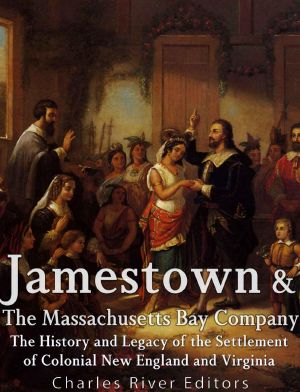Jamestown and the Massachusetts Bay Colony · the History and Legacy of the Settlement of Colonial New England and Virginia

- Authors
- Editors, Charles River
- Publisher
- Createspace Independent Publishing Platform
- ISBN
- 9781539836384
- Date
- 2016-10-31T00:00:00+00:00
- Size
- 1.93 MB
- Lang
- en
*Includes pictures* Includes contemporary accounts of the colonies *Includes a bibliography for further reading John Smith is one of the most common names in the English language and akin to the use of John Doe, but every Briton and American is familiar with the explorer and mercenary Captain John Smith, who helped found the first permanent English colony in the New World at Jamestown in 1607. Jamestown is fondly remembered today for being the first permanent English settlement in the colonies, but it was not fondly remembered by those who lived and died there. The English quickly learned it would be difficult to establish a permanent settlement because of the poor weather, the swampy terrain, the hostile natives living nearby, and the general inexperience and ineptitude of the English settlers. During their first winter, everyone nearly starved, and more than half of the settlers died. By the end of the winter of 1609-1610, known as the "starving time", barely 10% of the settlers were still alive. Nevertheless, Jamestown is remembered today because the settlement did survive through the hardships and go on to serve as the capital of the English colony for much of the 17th century. At the same time, one of the biggest reasons for its survival and fame today can be attributed to the local Native Americans, particularly Pocahontas, who has added both a human and romanticized, mythological element to Jamestown. She was the daughter of the paramount chief (mamanatowick) Powhatan, leader of an Algonquian-speaking native group in eastern Virginia. It was this group that Smith and the other English settlers came into contact with, and Smith credited her with saving him from being killed by the Native Americans. After that, Smith was able to establish relatively friendly relations and trade with the local inhabitants, ensuring Jamestown's survival. Though the Virginian colonists had difficulty in the beginning, by the late 1620s the Chesapeake area was thriving, having become a haven for those seeking economic opportunity in the new world. Pressures in England were growing as King Charles I was on the throne. Though Charles I himself was an Anglican, many suspected him of Catholic sympathies, a suspicion not alleviated by Charles I marriage to a French Catholic princess. Many Protestants had a growing desire to practice their faith and conduct their lives away from the mother country, and sought refuge in a destination called New England. The land chosen by this group, who "could pay their own way across the Atlantic" in contrast to the poorer settlers of the Chesapeake region was "colder, less abundant, but far healthier" than Virginia. Ultimately, the men of the New England Company decided that the time had come to remove themselves from England, and to pursue their lives in the Americas. The Dorchester Company was founded by a group of investors with an interest in settlement in the New World. This settlement would be a for-profit venture, but it would have as its two main causes the spreading of the Gospel to the Indian population and the stop of the spread of Roman Catholicism in the American colonies. John White, the company's leader, also wanted to compete with the separatists who had begun the Plymouth colony in 1620. Cape Ann, a promontory very near to Cape Cod was established by the Dorchester Company as an early settlement. The fishing was excellent, but Cape Ann proved unable to provide the farm goods needed to sustain the Puritan settlers who came to the New World. The Dorchester Company was dissolved, but investors seeking to salvage its aims formed the New England Company or Massachusetts Bay Company and secured a charter just before King Charles I dissolved the Parliament in 1629.